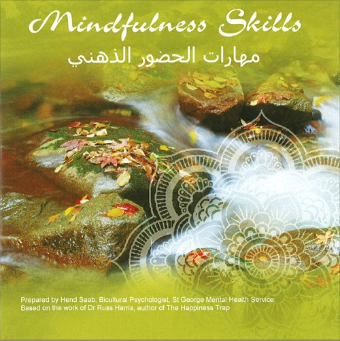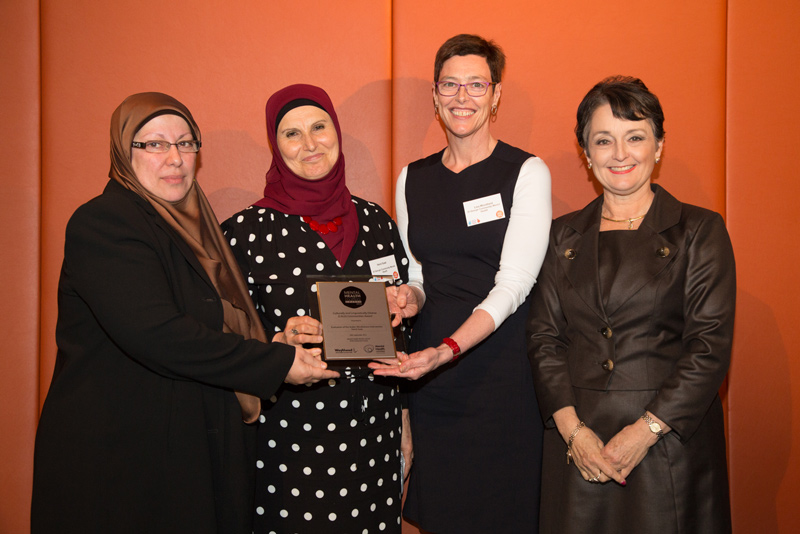Arabic Mindfulness
According to bicultural psychologist Hend Saab, the two biggest barriers to people from Arabic backgrounds seeking help for mental illness are cultural stigma and a lack of trust in mental health providers. They tend to seek help from more traditional avenues such as religious healers and traditional medicine first before turning to qualified mental health providers as a last resort- by which time their condition has deteriorated to the point where it makes helping them very difficult.
 As well, evidence indicates that mental health issues are highly prevalent in culturally and linguistically diverse (CALD) communities in general, with the World Health Organisation estimating that almost 50% of migrants globally suffer from mental health related trauma (Kljajic, 2009).
As well, evidence indicates that mental health issues are highly prevalent in culturally and linguistically diverse (CALD) communities in general, with the World Health Organisation estimating that almost 50% of migrants globally suffer from mental health related trauma (Kljajic, 2009).
Hend, who is a psychologist at at St George Community Mental Health Service, has developed an Arabic Mindfulness CD in an attempt to counteract some of this stigma, and provide people from Arabic backgrounds with a way of managing mental illness that fits in with accepted cultural practices.
“They hang onto things they know, they’re hanging onto things they believe in, it’s almost like it’s part of their identity,” she said.
“Having any continued challenge to that identity or feeling uncomfortable about the change… it’s more like resisting the change, as well as the stigma.”
She says that although she was confident that the CD worked based on her own observations using it herself as well as with patients, she wanted to test it out and make sure it was clinically effective as well. Together with research officer Fatima Hamdan, Dr Ilse Blignault from UNSW and fellow psychologist Lisa Woodland, she conducted a study in which 70 participants from Arabic backgrounds, all of whom identified as being Muslim or Christian, were asked to listen to a couple of tracks every week and provide feedback about how they felt afterwards. On average, the results showed “statistically significant improvements” in the participants’ mental health levels after listening to the CD, and 94% of them continued to practice mindfulness after the study ended.
“This was a superb project on so many levels,” said Clinical Psychologist and awards judge Frank Flannery, “It was conducted utilising benchmark experimental design and validated translated mental health measurement tools, it involved the successful engagement and participation of representatives of the Arabic community and it’s utility value is of the highest order for both mainstream and private mental health services that in the past have been challenged in providing an optimal service to non-English speaking consumers from the Arabic community. “

Hend Saab and the team from St George Community Mental Health Service receiving the Culturally and Linguistically Diverse Communities Award at the 2016 Mental Health Matters Awards
According to Hend, the goal of the study was primarily to establish if mindfulness was clinically effective as well as culturally acceptable. She admits the overwhelmingly positive results same as a surprise to her, however.
“We did not expect to have such an amazing result,” she said.
“We were very lucky. The thing is it’s very hard to get the community to participate in something like that. We were very fortunate in having the research officer [Fatima Hamdan], she’s well-respected and very diligent in her work, constantly calling the participants to make sure they were adhering to the instructions.”
Rather than telling people not to engage with their culture, Hend’s research is more focused on giving Arabic people avenues for help that are culturally familiar and non-threatening.
As religious leaders are often the first point of contact for people in the Arabic community seeking help for mental illness, Hend says that it is important to work with these leaders rather than against them to make sure that they’re well-equipped to handle the issue sensitively and refer people to qualified health providers wherever necessary.
“We don’t want to push them any further by attacking them,” she said.
“I think we need to work together… something like mindfulness, it helps your spirituality. These days with YouTube, you hear a lot of religious leaders, particularly from overseas, they’re open-minded, they’re incorporating things like that in their lectures which is good.”
Hend and her research team are continuing their studies into mindfulness as a culturally acceptable treatment. They are currently testing it out in group sessions with refugees and asylum seekers in the Illawarra region, and so far the feedback has been positive.
“The feedback we’re getting, you’ll hear someone saying “This has changed my life”, or something like that,” she said.
“ It’s helping them make sense of what they know.”
[soundcloud url=”https://api.soundcloud.com/playlists/100631472″ params=”auto_play=false&hide_related=false&show_comments=false&show_user=true&show_reposts=false&visual=false” width=”100%” height=”100″ iframe=”true” /]Kljajic, Kelly. Depression and Anxiety in the CALD Community [online]. Health Voices, No. 5, Oct 2009: 17-18
Newsletter
Stay up to date
Sign up to our Mind Reader newsletter for monthly mental health news, information and updates.